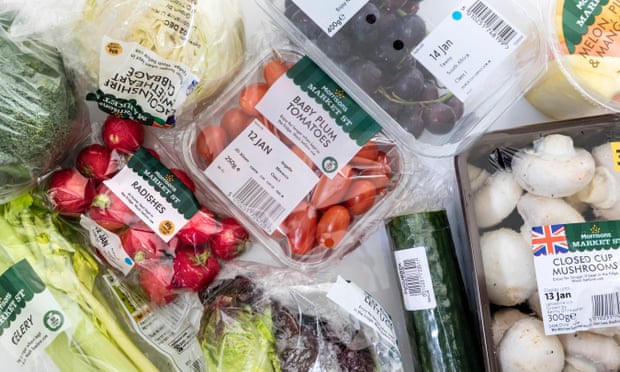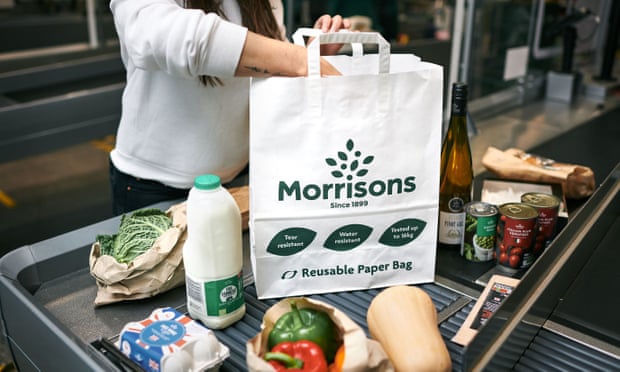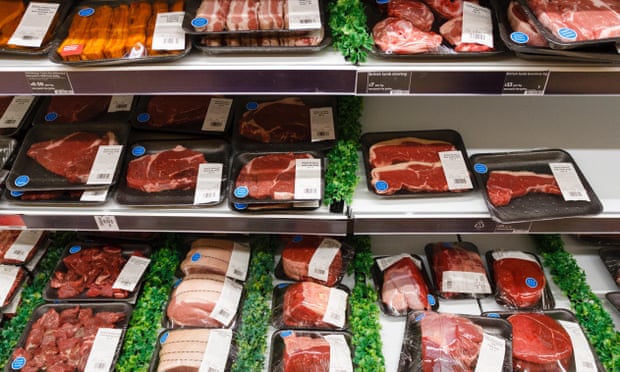Want to be a greener food shopper? We ask experts for their advice
We want to make the right decisions when we shop, but with so many different options on offer, how are we supposed to work out which one is best for the planet?
Guardian Money asked four experts. They are: Tim Lang, emeritus professor of food policy at City University, London’s Centre for Food Policy; Clare Oxborrow, senior sustainability analyst at Friends of the Earth; Isabella Woodward, researcher at the ethical comparison website The Good Shopping Guide; and Caroline Drummond, chief executive of Leaf (Linking Environment And Farming.
Is it greener to drive to a supermarket or book a delivery?
Tim Lang It depends on how much you buy. Practically, it’s hard to know what that delivery van’s impact is. If you own your own van and fill it on one trip, the carbon expended becomes proportionately smaller per food item than if you drive to the shop and buy little. The best strategy is to walk or cycle: you are taking exercise, putting the embedded energy in the food you eat to good use, and not polluting with your car. Electric cars simply push the pollution elsewhere – to the generating source..
Friends of the Earth There are so many factors. For deliveries, there are several questions. First, where is the food coming from – is it a warehouse? A shop? And how far away? Do they use refrigerated vans which use a lot of energy? Many supermarkets are switching to electric vans, so it’s important to check what’s available locally. The fact remains that travelling to the supermarket by foot or bike is the best choice, or opting for public transport.
Leaf For a van to deliver to some remote places, it may not be greener, but that driver could be the only person an individual living in a remote area has seen for the whole week … It is really important to understand the balance and trade-offs between impact on the environment, alongside economic viability and social acceptability and, indeed, health.
[caption id="" align="alignnone" width="620"] Food deliveries have an impact on the environment – but some say there are economic or social benefits. Photograph: Kathy deWitt/Alamy Stock Photo[/caption]
Food deliveries have an impact on the environment – but some say there are economic or social benefits. Photograph: Kathy deWitt/Alamy Stock Photo[/caption]
Is organic always better?
Tim Lang Not always. Organic has the huge advantage of not being associated with pesticide use. In July I saw at a UK supermarket organic spring onions grown in Mexico. That is ludicrous. In truth, consumers get next to no information on the multiple forms of impact our food has. That’s why I, and many people, call for a new “omni-label” system that provides the range of information: not just environmental but health, social and economic data. We don’t know, for example, how much of what we spend actually gets to the primary producer.
Friends of the Earth Organic is the gold standard … so if you can afford it, it’s a great option. When it comes to meat and dairy, it will almost always be the best environmental choice in a supermarket. It does cost a bit more, but buying less and swapping some meat in dishes with other protein-rich foods like lentils will make it go further.
The Good Shopping Guide Overall, organic crops are better for nature and the biosphere. Organic farming minimises the use of pesticides, which have a potentially adverse impact on wildlife and the soil. Additionally, pesticides can be harmful to agricultural workers. However, it is important to balance this against food miles. Organic products shipped from thousands of miles away may be more harmful to the environment. Therefore, we recommend buying locally grown organic ingredients wherever possible.
[caption id="" align="alignnone" width="620"] Switching away from single-use plastic can make a real difference. Photograph: David Forster/Alamy Stock Photo[/caption]
Switching away from single-use plastic can make a real difference. Photograph: David Forster/Alamy Stock Photo[/caption]
Can packaging cut food waste?
Tim Lang Plastic wrapping is often good news for retailers as they know it slows down the rotting process, but it is terrible for consumers and the environment. I always say: good food goes bad.
Friends of the Earth Wrapping fruit and veg in plastic can mask the fact that it’s no longer fresh. And fruit and veg left in airless plastic packaging will often go mouldy quicker than loose items without the needless wrapping. Considering that packaging is responsible for 70% of our plastic waste, there’s a huge difference to be made. It’s always better to buy loose fruit and veg, making sure they’re as fresh as possible. Stored correctly, they can last longer, too.
Leaf Packaging has certainly created an opportunity to stretch our seasons and storage for fresh fruit and veg; however, fossil fuel-based plastics and single-use plastics that are non-recyclable need to be phased out. The more we can stretch the time that fruit and veg are tasty, nutritious and assured of their growing quality, the better. Canning, freezing, packaging, storage, use of LED lights and growing capability all provide that opportunity. [caption id="" align="alignnone" width="620"] Morrisons offers sturdy paper bags at checkouts, as it looks to ditch all its plastic ‘bags for life’. Photograph: Morrisons/PA[/caption]
Morrisons offers sturdy paper bags at checkouts, as it looks to ditch all its plastic ‘bags for life’. Photograph: Morrisons/PA[/caption]
Which bags should I use?
Tim Lang If you walk to the shops, invest in a good trolley. Trolleys are trendy. Plastic bags are bad news full stop, but the avalanche continues, and it’s hard to avoid them unless you get into the habit of carrying your own bag.
Friends of the Earth Those designed to be reused tend to have a lower environmental impact than single-use plastic bags but, importantly, they must be used a sufficient number of times. For cotton bags, 50-150 times; paper bags, four-eight times; durable plastic bags like bags for life, 10-20 times. Cotton bags can be used for years, and can be washed and reused. So if you take the long view, cotton is best and more durable than plastic, particularly if it’s organic, unbleached fibre.
The Good Shopping Guide There are pros and cons to all types of shopping bags. The main problem is that many people use them once and discard them after. Regardless of what material they are, single-use bags are always unsustainable. Whichever bags you prefer to use, remember to bring them to the shop with you.
Leaf I am a big fan of the cotton tote bag. We have seen a lot of movement away from people always expecting a new plastic carrier bag when shopping, and our next step is to strive to ensure the bags we use are long-lasting, sustainably sourced and robust.
[caption id="" align="alignnone" width="620"] Cutting down on meat is one way to help the environment. Photograph: Ed Brown/Alamy[/caption]
Cutting down on meat is one way to help the environment. Photograph: Ed Brown/Alamy[/caption]
What’s the top thing a shopper should do to help the planet?
Tim Lang Cut down on meat. Eat it less often and buy high-quality meat such as pasture-fed. Less but better.
Friends of the Earth Livestock production has an enormous environmental impact, contributing 14.5% of the world’s planet-warming emissions. The industry is also a key driver of deforestation and the loss of important habitats, not to mention the huge amount of water and fertiliser needed, or the amount of waste produced in the process. That’s why buying and eating less meat and dairy is one of the best ways to reduce our own environmental impact.
The Good Shopping Guide Be aware of the ethical issues. This not only relates to which supermarket you use, but also which brands you are buying. We independently assess companies on their practices towards the environment, animals and people, providing a score out of 100 for each brand.
Leaf Naturally, seek out and purchase Leaf Marque produce. Quality fruit and veg grown with care for the environment, enhancing biodiversity, improving our soil health and water quality, and grown by farmers committed to more regenerative, climate-positive farming systems. Plus, go and visit a farm to see what farmers are doing to address climate change challenges.
Source The Guardian